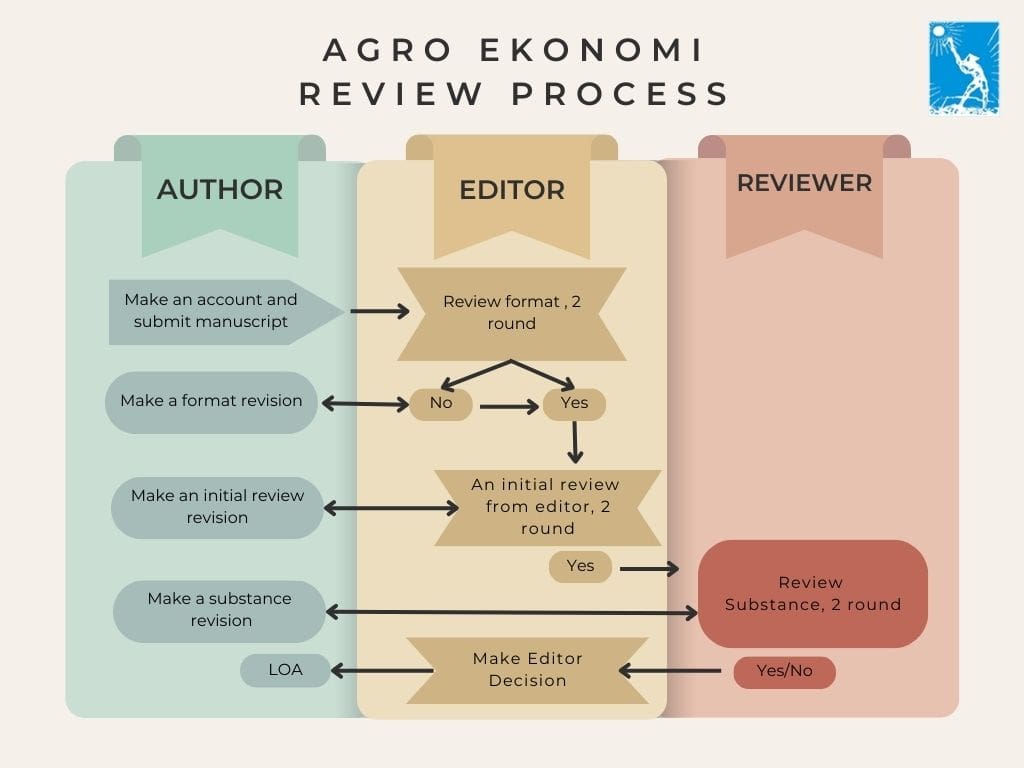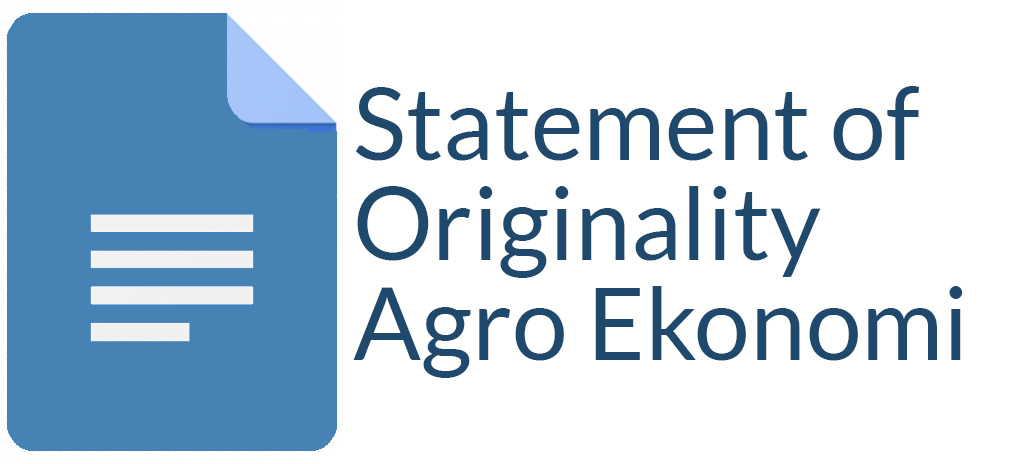Ispo Certification and Indonesian Oil Palm Competitiveness in Global Market: Smallholder Challenges Toward ISPO Certification
Sakti Hutabarat(1*)
(1) Department of Agribusiness, Faculty of Agriculture, University of Riau
(*) Corresponding Author
Abstract
Certification becomes a prerequisite for tradable products to get legality and access to global market. Each tradable product can choose certificate according to its market destination. However, the application of certification standards are very low in both international (RSPO and ISCC) and domestic (ISPO) standards. This study was focused on the ISPO certification. How large is the gap between current practices and ISPO standard? What are factors that affect adoption of ISPO certification? Does ISPO deliver more access to market for oil palm smallholders? Do smallholders have adequate capacity to meet ISPO standard? These questions have been assessed and discussed in this paper to find answer and alternative way out for smallholders to meet the ISPO standard. The objective of this study is to assess capacity and willingness of oil palm independent smallholders to meet the standard of ISPO certification. This study was conducted in Pelalawan District, Riau Province using a survey method. The result shows that a number of barriers are faced by smallholders to obtain ISPO certification while the opportunity to get better access to local and global market is still uncertain. The adoption of ISPO certificate was influenced by farmers’ knowledge on agricultural practices, business legality, household income, and land-size.
Keywords
Full Text:
PDFReferences
Aidoo, R., & Fromm, I. (2015). Willingness to Adopt Certifications and Sustainable Production Methods among Small-Scale Cocoa Farmers in the Ashanti Region of Ghana. Journal of Sustainable Development, 8(1): 33-43.
Amekawa, Y. (2010). Rethinking Sustainable Agriculture in Thailand: A Governance Perspective. Journal of Sustainable Agriculture, 34(4): 389-416. doi: 10.1080/10440041003680254
Arifin, B. (2016). Roles of Commodities in Poverty Alleviation and Strengthening Landscape Management: Towards Sustainability Advantage. Paper presented at the Workshop Perencanaan Tataguna Lahan dan Pengelolaan Sumberdaya Alam, Kementerian Koordinator bidang Perekonomian dan CIFOR, 26 April 2016. Jakarta.
Bacon, C. (2005). Confronting the Coffee Crisis: Can Fair Trade, Organic, and Specialty Coffees Reduce Small-Scale Farmer Vulnerability in Northern Nicaragua? World Development, 33(3): 497-511. doi: 10.1016/j.worlddev.2004.10.002
Bacon, C. M., Méndez, V. E., Gómez, M. E. F., Stuart, D., & Flores, S. R. D. (2008). Are sustainable coffee certifications enough to secure farmers livelihoods? The millenium development goals and Nicaragua’s fair trade cooperatives. Globalizations, 5(2): 259-274. doi: 10.1080/14747730802057688
Barham, B. L., Callenes, M., Gitter, S., Lewis, J., & Weber, J. (2011). Fair Trade/Organic Coffee, Rural Livelihoods, and the “Agrarian Question”: Southern Mexican Coffee Families in Transition. World Development, 39(1): 134-145.
Barham, B. L., & Weber, J. G. (2012). The Economic Sustainability of Certified Coffee: Recent Evidence from Mexico and Peru. World Development, 40(6): 1269-1279. doi: 10.1016/j.worlddev.2011.11.005
Beuchelt, T. D., & Zeller, M. (2011). Profits and poverty: Certification’s troubled link for Nicaragua’s organic and fairtrade coffee producers. [Special Section: Ecological Economics and Environmental History]. Ecological Economics, 70(7): 1316-1324. doi: 10.1016/j.ecolecon.2011.01.005
Bitzer, V., Glasbergen, P., & Arts, B. (2013). Exploring the potential of intersectoral partnerships to improve the position of farmers in global agrifood chains: findings from the coffee sector in Peru. Agriculture and Human Values, 30(1): 5-20. doi: 10.1007/s10460-012-9372-z
Blackman, A., & Jorge, R. (2011). Producerlevel benefits of sustainability certification. Conservation Biology, 25(6): 1176-1185. doi: 10.1111/j.1523-1739.2011.01774.x
Brandi, C., Cabani, T., Hosang, C., Schirmbeck, S., Westermann, L., & Wiese, H. (2015). Sustainability Standards for Palm Oil: Challenges for Smallholder Certification Under the RSPO. Journal of Environment & Development, 24(3): 292.
Calil, D. (2013). Oil palm smallholders’ willingness to pay for RSPO certification (Case study in Riau and Jambi, Indonesia). Paper presented at the RT 11 RSPO, 11-14 November 2013. RSPO, Medan.
Christin, S., Hutabarat, S., & Dewi, N. (2015). Keragaan Petani Kelapa Sawit Pola KKPA dalam Menghadapi Sertifikasi di Desa Bina Baru Kecamatan Kampar Kiri Tengah, Kabupaten Kampar. Jurnal Online Mahasiswa Fakultas Pertanian Universitas Riau, 2(1): 1-12.
FAO. (2014). Impact of international voluntary standards on smallholder market participation in developing countries: A review of the literature. Agribusiness and Food Industries Series.
Gawron, J.-C., & Theuvsen, L. (2010). Agrifood certification schemes in an intercultural context: Theoretical reasoning and empirical findings. Food Economics – Acta Agriculturae Scandinavica, Section C, 7(2-4): 209-221. doi: 10.1080/16507541.2010.531944
Gockowski, J., Afari-Sefa, V., Sarpong, D. B., Osei-Asare, Y. B., & Agyeman, N. F. (2013). Improving the productivity and income of Ghanaian cocoa farmers while maintaining environmental services: what role for certification? International Journal of Agricultural Sustainability, 11(4): 331-346. doi: 10.1080/14735903.2013.772714
Harianja, K., Hutabarat, S., & Dewi, N. (2015). Analisis Persepsi Petani Kelapa Sawit Pola Swadaya Menghadapi Sertifikasi RSPO di Kecamatan Ukui, Kabupaten Pelalawan. Jurnal Online Mahasiswa Fakultas Pertanian Universitas Riau, 2(1): 1-13.
Hidayat, N. K., Glasbergen, P., & Offemans, A. (2015). Sustainability Certification and Palm Oil Smallholders’ Livelihood: A Comparison between Scheme Smallholders and Independent Smallholders in Indonesia. International Food and Agribusiness Management Review, 18(3): 25-48.
Hutabarat, S., Slingerland, M., & Dries, L. (2017). The prospects and challenges of certification for different types of oil palm smallholders. in Progress.
Hutabarat, S., Slingerland, M., Rietberg, P., & Dries, L. (2017). Costs and benefits of certification of independent smallholders. Submitted.
Kaminski, J., Headey, D., & Bernard, T. (2011). The Burkinabè Cotton Story 1992–2007: Sustainable Success or Sub-Saharan Mirage? World Development, 39(8): 1460-1475.
Kuwornu, J. K. M., Nafeo, A. A., & OseiAsare, Y.B.(2013). Financial Viability, Value Addition and Constraint Analyses of Certified Organic Pineapple Production and Marketing in Ghana. African Journal of Basic & Applied Sciences, 5(1):12-24.
Lee, J. S. H., Ghazoul, J., Obidzinski, K., & Koh, L. P. (2014). Oil palm smallholder yields and incomes constrained by harvesting practices and type of smallholder management in Indonesia. Oil palm smallholder yields and incomes constrained by harvesting practices and type of smallholder management in Indonesia, 34(2): 501-513.
Lee, J. S. H., Rist, L., Obidzinski, K., Ghazoul, J., & Koh, L. P. (2011). No farmer left behind in sustainable biofuel production. Biological Conservation, 144(10): 2512-2516.
Lemeilleur, S. (2013). Smallholder compliance with private standard certification: the case of GlobalGAP adoption by mango producers in Peru. International Food and Agribusiness Management Review, 16(4): 159-180.
Makita, R. (2012). Fair Trade and organic initiatives confronted with Bt cotton in Andhra Pradesh, India: A paradox. [Themed issue: Spatialities of Ageing]. Geoforum, 43(6): 12321241.
Manggabarani, A. (2009). Palm Oil: A Golden Gift From Indonesia to the World. Directorate General of Estate Crops in Colaboration with Sinar Mas, Jakarta. 102p.
Ouma, S. (2010). Global standards, local realities: private agrifood governance and the restructuring of the Kenyan horticulture industry. Economic Geography, 86(2): 197-222. doi:10.1111/j.1944-8287.2009.01065.x
Prodinger, B., Rudman, D. L., & Shaw, L. (2015). Institutional ethnography: studying the situated nature of human occupation. Journal of Occupational Science, 22(1): 71-81.
Raynolds, L., Murray, D., & Heller, A. (2007). Regulating sustainability in the coffee sector: A comparative analysis of third-party environmental and social certification initiatives. Agriculture and Human Values, 24(2): 147-163. doi: 10.1007/s10460006-9047-8
Silva-Castaneda, L. (2012). A forest of evidence: third-party certification and multiple forms of proof-a case study of oil palm plantations in Indonesia. [Article]. Agriculture and Human Values, 29(3): 361-370. doi: 10.1007/s10460-012-9358-x
Suharni, Waluyati, L. R., & Jamhari. (2017). The Application of Good Agriculture Practices (GAP) of Shallot in Bantul Regency. Jurnal Agro Ekonomi, 28(1): 48-63.
Weber, J. G. (2011). How much more do growers receive for Fair Tradeorganic coffee? Food Policy, 36(5): 678-685. doi: 10.1016/j.foodpol.2011.05.007
Wijaya, A., & Glasbergen, P. (2016). Toward a New Scenario in Agricultural Sustainability Certification? The Response of the Indonesian National Government to Private Certification. The Journal of Environment & Development, 25(2): 219-246. doi: 10.1177/1070496516640857
Article Metrics
Refbacks
- There are currently no refbacks.
Copyright (c) 2018 Agro Ekonomi

This work is licensed under a Creative Commons Attribution-ShareAlike 4.0 International License.
AGRO EKONOMI ISSN 0215-8787 (print) , ISSN 2541-1616 (online) indexed by :











